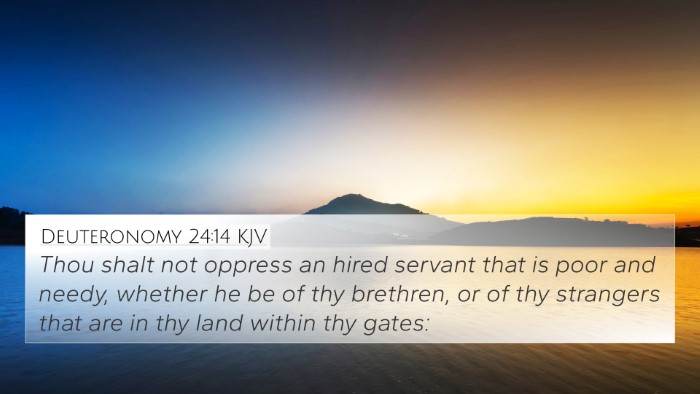Understanding Job 31:13
The verse Job 31:13 reads:
"If I have denied justice to my menservants and maidservants when they had a grievance against me,"
This verse captures Job's reflection on justice, particularly in the context of his relationship with his servants. Here we explore its meaning through insights from public domain commentaries.
Contextual Overview
In the chapter leading to this verse, Job is asserting his integrity and righteousness in the face of suffering. He highlights how he has treated those in positions of lesser power with fairness.
Insights from Commentators
- Matthew Henry: Henry emphasizes the importance of justice in everyday life, stating that Job is reaffirming his moral responsibility, particularly towards those dependent on him. This reflects a broader biblical principle that God commands fairness and compassion in our dealings with others.
- Albert Barnes: Barnes points out that Job’s conscience is clear and he holds himself accountable for the treatment of his servants. He suggests that Job's position highlights the weight of justice in personal relationships, indicating that a true follower of God will uphold fairness at all times.
- Adam Clarke: Clarke discusses the ramifications of injustice, arguing that Job understands the gravity of denying justice to anyone, especially those who are vulnerable. He reflects on the nature of God’s character, which demands that earthly conduct mirror divine justice.
Thematic Connections
This verse connects to broader biblical themes concerning justice, accountability, and compassion. It echoes the societal roles and the importance of fair treatment.
Bible Verse Cross-References
- Exodus 23:1-3: A reminder of the necessity of not bearing false witness and upholding justice.
- Leviticus 19:13: Prohibition against oppression and injustice, emphasizing fairness in labor relations.
- Proverbs 31:8-9: Encouragement to speak up for the rights of all, particularly the marginalized.
- James 5:4: A warning to those who exploit workers and a call for justice.
- Matthew 20:13-15: The parable of the workers in the vineyard, discussing fair treatment and justice in pay.
- Luke 16:10: Faithfulness in little things, such as just treatment, is vital for greater responsibilities.
- Colossians 4:1: A reminder to masters to provide just treatment to their servants, reflecting divine justice.
Bible Cross-Reference Guide
This guide can help you navigate connections between biblical texts:
- Tools for Bible cross-referencing: Utilizing Bible concordances can reveal thematic connections.
- Bible cross-reference study: Methods to identify linked verses aid in better understanding scripture.
- How to use Bible cross-references: Familiarity with cross-referencing techniques enhances interpretation.
Conclusions
Job 31:13 serves not only as an assertion of personal righteousness but also as a broader call for justice. Engaging with this verse through commentary insights and cross-references enriches our understanding of its moral implications.











